Interview: Nick Frost opens up on his dark past
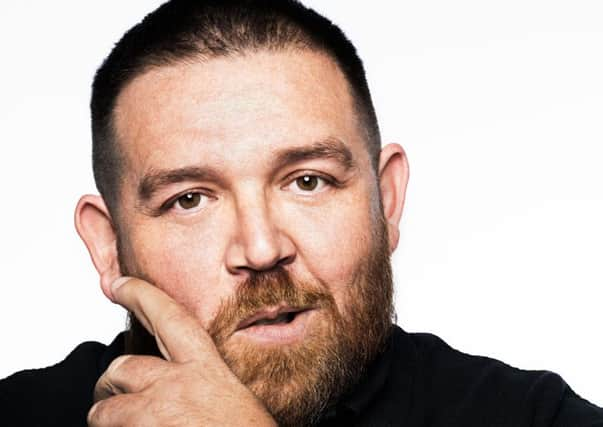

THE last time I met Nick Frost we were talking Cuban heels, satin shirts and dancing at weddings. He had just made Cuban Fury, in which he played Bruce, a middle-aged man who’d given up salsa dancing as a kid but who rekindles his passion to try to woo his new boss. The part involved seven months of intensive salsa dance training. “If I was Daniel Day-Lewis I’d be up for an Oscar in terms of f***ng effort alone,” he said.
The chat at the time was about dancing at his wedding (he’d been too shy to really go for it – part of the reason for learning) and food (he loves to cook and was wondering about attempting a little pop-up restaurant) and being a big man (“I’ve seen women in LA move away from me as though they might catch it”), and of course, his son, who was then two and made his face light up whenever he mentioned him.
Advertisement
Hide AdThe chat today feels different. He’s just as funny and warm and he still loves to talk about his boy – now four – who is “amazing and funny and cheeky and handsome and lovely, really lovely”. But there’s a darker strand to our conversation and a kind of nervousness. On my part it’s because I’ve just finished Frost’s autobiography, Truths, Half Truths And Little White Lies, and it’s left me reeling. On his part, it’s because he’s getting to grips with the fact that the book is no longer just an idea, or a project, or even a big, fat document sitting on his laptop. It’s done, published and available for everyone to read.
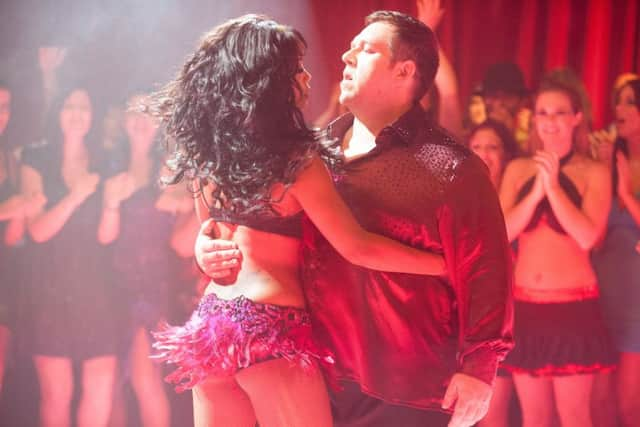

Frost is keen to disabuse us of the idea that he only came into being with Spaced, the cult Channel 4 programme written by Simon Pegg and Jessica Stevenson (now Hynes) in which Frost did his first acting. “I sometimes imagine that people think I popped into existence when I was 29 and became Simon’s best mate,” he says. “That’s the first thing that people know or remember about me, which is fine, but with this it was a chance to say I had a whole life before then.”
I think he might object to the folded down corners of my proof copy – after all, he is a man with a pristine first edition of Close Encounters Of The Third Kind which he got signed by Steven Spielberg when he worked with him a few years ago on Tintin (Frost and Pegg were Thomson and Thompson, naturally). My copy of his book looks like it’s been fished out of the bin. “I don’t care,” he says, picking it up off the table and flicking through it.
He lets out a kind of sigh – not dejected, not satisfied, nervous-sounding. “I’ve not seen it typeset. It looks like a proper book.” And that it is. As a memoir, it’s funny, sad, totally no-holds-barred. Frost has written about his life as openly as I imagine anyone ever could; “warts and all” is how he puts it. And the subject matter isn’t easy. Alcoholism, bankruptcy, abandonment, death, violence, depression. Have I mentioned that it’s funny? It is. Honestly.
“It feels weird,” he says, turning it over in his hands. “It’s going to feel weird when I get one of the 20 I’m allowed contractually.” He rolls his eyes. “As soon as they became available on Amazon a month ago, I bought five. A hundred quid.” He laughs. “I just wanted to get the ball rolling.”
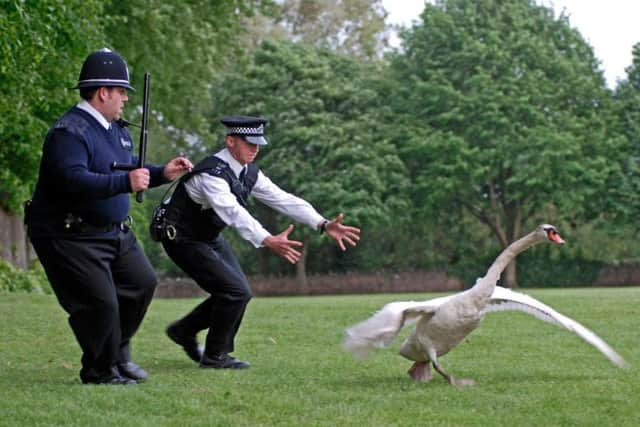

Frost suffers hugely from nerves. The journey to the red carpet for the premiere of his movies is, he says, like the journey he made to the crematorium when his mum died. The pace is excruciatingly slow, the fear of what’s at the other end overwhelming. He has often spent the day before any new job vomiting. He’s frightened he won’t do it well, won’t know his lines, won’t learn anything. Once he’s on stage, or on the red carpet, or saying the lines, he’s OK. But the anticipation, the build-up is frankly dire. It’s one thing waiting for a film, even one you’ve written and produced and starred in; but a book that is all about you and your family, that explores the reasons why life is this tricky sometimes – that must be terrifying.
Advertisement
Hide Ad“I wrote it never really quite realising I’d have to do this and then it would come out,” he says. “Even yesterday I was thinking, ‘Just give the money back.’ But it is what it is and… you know.” He shrugs and smiles nervously. I tell him I found his book entertaining and moving and unbelievably honest. I’m hoping that if he knows I like it he’ll relax.
“Funny?” he interrupts. It is most definitely funny, I just hadn’t got round to saying that yet. “I tried to balance it because if it wasn’t funny then I think it’d be a pretty bleak read.”
Advertisement
Hide AdHe’s right. The comedy is levity, but it doesn’t distance us from the difficulties that Frost has had to endure or the toll that they’ve taken on him. His is the kind of book that makes you grimace and shake your head and wonder at just how hard life is sometimes. And how amazing it is that we survive; some of us, like Frost, managing to do even more than that.
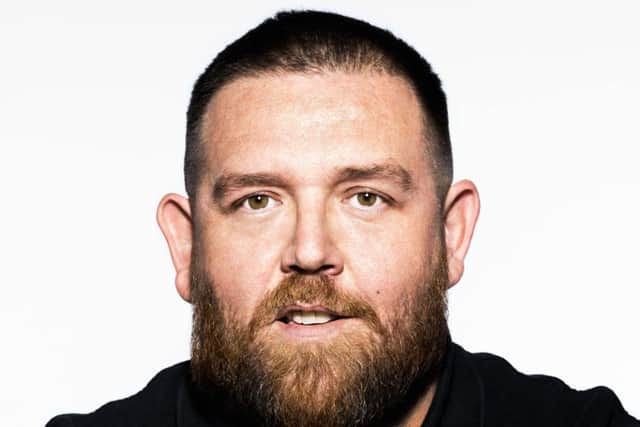

Frost’s life wasn’t always chaotic. He was born in Essex to Tricia and John. They loved him and they loved each other. They’d both been married before and had kids from their previous marriages. Their histories, as much as Frost knew, were complicated: his mum’s first husband had been violent to her and his dad’s first wife had emigrated to New Zealand, taking their children. But Frost didn’t know much of the complexity of all that when he was a kid. It was family history, the stuff that seems hazy and unknowable, maybe not even that interesting, until things start going wrong and it comes into the sharpest focus.
Frost’s early days were unremarkable. As a kid, it was larks with mates and a load of cousins at his grandparents’ in Wales. As a young teen there was more silliness and fun as well as plenty of boozing and dope smoking. The local rugby club was the place where the family socialised. There were plenty of high jinks, but everything seemed kind of OK. But really it wasn’t. Frost’s mum was an alcoholic. And his dad was a workaholic. When his dad decided to quit his job designing and selling high-end office furniture and set up his own business, it was a turning point that changed all of their lives irrevocably.
Frost’s parents worked every hour of the day to make the new business a success, but when the orders couldn’t be fulfilled in time by just his mum and dad working in the garage until the wee small hours, things went wrong frighteningly fast. It wasn’t long before the family had lost everything. The business folded, the car was taken away, the house was repossessed, Frost and his mum and dad were literally put out on the street. His dad was utterly broken by the experience of losing his livelihood and everything they had. His mum had a stress-induced stroke. Frost was only a teenager and looked on with a sense of utter terror.
He doesn’t write it quite like that, but how could it have been any other way? They lived with their neighbour for a bit until the council gave them a flat in a high rise called Ray Lodge (“it sounds like an Australian prison”) on a rough housing scheme.
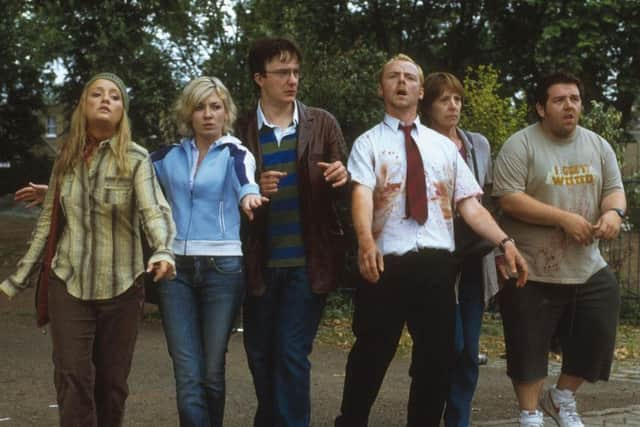

Things at this stage got very dark for the family. Frost’s dad had a nervous breakdown and never really recovered. His mum’s drinking escalated and Frost jacked in school to get a job, earn some money and help support them. Ray Lodge was never a home for him, though. He couldn’t bear it. He was in despair about his parents, who were both too lost in their own stuff to really look after him. Meanwhile, his mates, the way that teenagers do, just kind of disappeared. “I hated my life, I felt so alone, so lonely,” he writes. “I found it all too much watching my mum kill herself. Watching my dad, a shell of a man, broken, quiet, absent… I think this was the point my depression started. I was 17 or 18 years old. I didn’t realise what depression was for another 20 years or so.”
Advertisement
Hide AdBy the time Frost was 39, both of his parents were dead. He had lost two half-sisters and a half-brother too; his other half-brother died while he was writing this book. He was the last. “It was like every time I did a big project or a big film someone else died,” he says. “It was like maybe I should just stop working.” He laughs, sort of. “I just did The Huntsman and the day before we started shooting, my brother died. Six months ago. It was like ‘F**k, really?’ But that’s everyone. Maybe now I won’t get another job.” He laughs, but not really. “I don’t believe in all that shit. It’s just what my life was, is. Would I want to change it? I’m not sure. Maybe. I’d like my mum and dad to still be around, but how would that affect this current timeline? I like to be able to quote Back To The Future in an interview about my autobiography.”
Frost is utterly honest both in person and on the page. There’s more hesitancy in person, of course, but that feels like shyness more than anything else. On the page, he is unsparing about himself but also about others. “If my mum was alive she’d be mortified,” he says. “But she’s not, no-one is. I was never going to be anything but honourable, but I was always going to tell the truth.”
Advertisement
Hide AdHe wants his book to be successful, but more than that, he hopes that if someone who reads it happens to have an alcoholic parent, they’ll see that you can survive. He “trudged on” is how he puts it, and ended up doing pretty well for himself. “In terms of being cross at my mum for drinking, that’s gone, years and years ago, because logically I get it. But that took a while. When you view your parents as people that’s a really eye-opening time. It was eye-opening for me to realise, ‘Ah, she’s afraid, or as much as she loves me, she just can’t give it up.’ I understand it.”
Frost regrets never asking more questions of his parents. It was a missed opportunity. “I’ve done things differently with my son,” he says. “He’s four and we talk and have a laugh. Everything that happened to me means that he’ll have a very different upbringing.”
Discovering that he was to become a father was almost like flicking a switch for Frost. And it couldn’t have come at a better time. He was in his late 30s. He was a success – a movie actor, a writer and producer, but he was at a seriously low ebb. He was suicidal. I start to ask him about the impact of becoming a father.
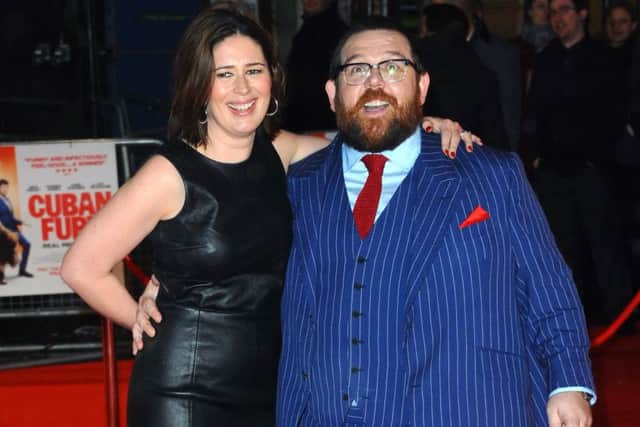

“Twelve hours,” he says. “That’s what it was between the worst point and that not being there anymore. It was amazing. It was just exactly what I needed.” He can still see his then wife, Chris – they have since separated – looking at him that night. “She was thinking, f***, he’s going to do something,” he says. “For her to then come out of the toilet, her little hand shaking holding a positive pregnancy test, it was like, f***, where did you get that from? It was amazing.”
He reckons that before his son was born he was “very selfish”. But now, he has a sense that it’s about him, his boy, more than anything else. After he’d written the book he gave it to Chris to read. “She’d phone up crying,” he says. “She was sad about the life and a bit shocked at how open I was.” Indeed when it comes to the drinking, the drugs, the messiness, he doesn’t flinch. “I’d like to think it doesn’t glamorise those things,” he says. “I want them to be a warning. And I want my son to know he has a father who he can come to with anything.”
Part of who he is means that Frost is utterly driven when he’s working. He devotes everything he has to it. It must, he says, make him difficult to live with, to be around even. “I’m at my worst when I just finish a job and I’ve got four weeks off and it’s like ‘Now what? What am I going to do?’ If you see me going into the cinema at 11 in the morning you know I need to work.”
Advertisement
Hide AdFortunately this means he’s massively motivated. He usually has half a dozen things on the go at any time. “It’s like, ‘Right, let’s write something – a children’s book – or start a film, or take notes.’ I keep tons and tons of notes in my phone and every now and then I’ll write them up and it’s like ‘OK, that’s a pretty good idea, let’s see if we can write a chapter.’ It’s all money in the bank. If it’s something good then someone will say right let’s develop this. It’s not lost time.
“If I could write books or scripts and direct movies, that’d be me, I’d be pleased. If I didn’t act again it wouldn’t…” he runs out of words, or rather he’s said them already. “It takes too much out of me in terms of being sick all the time and being frightened that I’m not good or I’m not going to learn any more. It’s too stressful. If I could sit somewhere nice and see the sea and write, that’d be pretty cool.” If anyone has earned the break, it’s Frost.
Twitter: @scottiesays
Advertisement
Hide Ad• Truths, Half Truths And Little White Lies is published by Hodder & Stoughton and costs £20. Nick Frost will be talking and signing copies of his book on 23 October at Waterstone’s Glasgow (Sauchiehall St) and on 24 October at Waterstone’s Edinburgh (West End). He will also be appearing at the Dundee Literary Festival on 24 October, www.literarydundee.co.uk